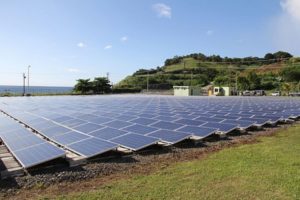Energy security is at the top of the agenda for Caribbean leaders and it has been for some time.
With an average cost of electricity four times higher than in rich nations such as the United States, high energy costs are not only a daily hardship for Caribbean people but also one of the key bottlenecks for unleashing economic growth and prosperity in the region.
While the recent drop in oil prices is relieving some of the pressure, it also represents an opportunity to look into strategies for increasing energy security in the region. This means investing in clean energy, and saving energy through more efficient production and consumption.
To help achieve this transformation, Caribbean leaders and leading energy partners agreed to pursue a joint regional framework for energy development at the Caribbean Energy Security Summit this week in Washington, DC.
Most small Caribbean countries, particularly the Eastern Caribbean States, depend almost entirely on petroleum to supply their electricity needs—with oil and gas expenditures taking between seven to 20 percent of a country’s GDP.
The region has achieved nearly universal electrification and almost all households are connected to the grid, with the exception of Haiti. After the devastating earthquake that hit Haiti’s capital city of Port-au-Prince five years ago, the availability and reliability of modern energy services remains crucial to the recovery and sustainable development of the country, where only 28 percent of the population has regular access to electricity.
When walking in the streets of Port-au-Prince or Basseterre in St. Kitts and Nevis, you can now see that many of the street lights are solar. The Caribbean region has a diverse and large renewable energy potential, including not only solar, but also wind, geothermal, biomass and marine energy. While solar and wind are intermittent, they can be used in combination with renewable geothermal power or clean natural gas power.
A recent World Bank study showed that seven Eastern Caribbean countries have potential for geothermal energy generation, which would help reduce costs for their oil-dependent electricity sector. On the island of Guadeloupe, the La Bouillante power station is already generating 15MW by means of geothermal energy. Exploratory drilling and preparatory work is happening in Dominica, Grenada, Montserrat, St. Lucia, St. Kitts and Nevis, and St. Vincent and the Grenadines.
Yet oil and gas-based electricity generation will continue to dominate for some time. Another priority agreed by Caribbean governments during the Summit is to reduce inefficiencies in their energy systems by saving energy and reducing waste. What this means is modernizing electricity distribution companies and grid systems, but also on the consumer side making buildings more energy efficient and replacing old equipment and appliances, using for instance high efficient air conditioners and LED light bulbs.
Read More at Caribbean360

